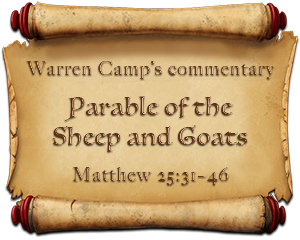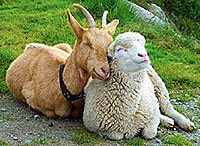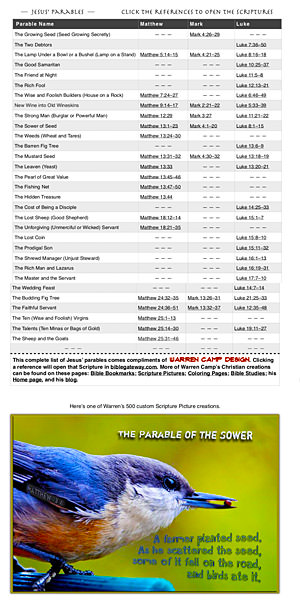In this parable, found only in Matthew’s gospel, Jesus tells the Parable of the Sheep and Goats to describe and predict the judgment of all people.
It also clearly documents how our actions demonstrate our true beliefs.
Incidentally, Jesus spoke about the heaven-or-hell judgment more than anyone else in the Bible and in a very specific way. More than half of the parables that Jesus told relate to God’s eternal judgment of sinners.
— Preview —


Click the list or the “bird” to enlarge and use Warren’s list of forty-four of Jesus’ parables (a PDF file with links to Scriptures).
par•a•ble [noun] a simple story used to illustrate the meaning of or a moral or spiritual lesson, as told by Jesus in the gospels
synonyms: allegory, moral story/tale, fable
Jesus’ Parable of the Sheep and Goats
Matthew 25:31–46
While Parable of the Sheep and Goats is characterized as a parable, it differs from most parables because it doesn’t purport to relate a story of events happening to fictional characters. This story, found only in Matthew’s gospel, concludes what is often referred to as his Olivet Discourse (Christ's orderly and extended teaching on the Mount of Olives) and immediately precedes his account of Jesus’ passion period and resurrection.
This passage directly addresses, in Jesus’s own words, one of the most challenging questions in Christian theology: Who goes to heaven, and why? Matthew paints a vivid picture of Jesus standing outside the temple in Jerusalem, telling his followers about his second coming. The irony couldn’t have been greater: As Israel rejected the first coming of Jesus, he spoke to them of his second coming.
Jesus begins this parable by telling his listeners and readers in v. 1 that it deals with his glorified return, so he can set up his kingdom. The setting of Christ’s return is at the beginning of the millennium, at the end of the tribulation. In a nutshell, everyone on earth will then be brought before the Lord when he’ll separate people “as a shepherd separates the sheep from the goats. He will put the sheep on his right and the goats on his left” (vv. 32–33). The sheep are those who’ll be saved during the tribulation; the goats are the unsaved people who'll be cast down as a result of Messiah's judgment.
The "sheep-goat judgment" is an awesome and sobering future reality. The people not judged, damned, and carried off to the fires, who are still alive and in their mortal bodies, will face Messiah's earthly judgment. He'll judge the unbelievers the same way a shepherd separates sheep from goats.
Animated 3-minute video, compliments of LC Lifekids
The Parable of the Sheep and Goats
A Parable of Judgment
First putting this judgment-specific parable into context, we see how in Matthew, beginning in chapter 24, Jesus had given a long, multifaceted answer to a question his disciples asked him in 24:3 about his return and the end times. He answered by including these discussions: “the destruction of the temple” (24:1–2), “birth pains” (24:8), “the coming of many false prophets” (24:11, 22–25), “the abomination that causes desolation” (24:15–21), “the Son of Man coming on the clouds of heaven, with power and great glory” (24:26–31), and ”Noah and the flood” (24:36–39).
In his presentation of the unknown day and hour of his return, Jesus told these stories to his disciples: the Parable of the Budding Fig Tree (24:32–35), the Parable of the Thief at Night (24:42–44), the Parable of the Wise and Faithful Servant (24:45–51), the Parable of the Ten Virgins (25:1–13), and the Parable of the Bags of Gold (vv. 14–30). With each pronouncement in chapters 24 and 25, his words became more forceful. Here, in his final saying, Jesus spoke plainly enough for us to hear him, twenty centuries later. He concluded his answer to his disciples’ question — “When will this happen, and what will be the sign of your coming and of the end of the age?” — by telling them his Sheep and Goats Parable.
The words of Jesus in his opening verse are breathtaking: “When the Son of Man comes in his glory, and all the angels with him, he will sit on his glorious throne.” These statements fall on us with breathtaking speed. The carpenter from Nazareth claimed plainly to be the Son of Man whom Daniel described in his prophecies from centuries before (see Daniel 7); Jesus can be expected to command all the angels of heaven and sit on a throne of judgment that oversees all of human history. In his first coming to earth, Jesus came as “the Lamb of God who takes away the sins of the world” (John 1:29). In Matthew 25, he reveals that in his second coming he’ll return as the judge of all humanity.
This parable is consistent with the rest of Jesus’ “judgment” parables. In each he spoke about the results of the Lord’s day of return when people will be separated into two groups only, made up, that is, of the prepared and unprepared, the righteous and the wicked, those who are “in the kingdom” and those who aren’t. When he returns to earth, everyone here will be brought before the Lord. He’ll then separate people “as a shepherd separates the sheep from the goats. He will put the sheep on his right and the goats on his left” (vv. 32–33). The sheep represent those who’ll be saved during the seven years of tribulation; the goats represent the unsaved people who’ll have survived the tribulation.
31“When the Son of Man comes in his glory, and all the angels with him, he will sit on his glorious throne. 32All the nations will be gathered before him, and he will separate the people one from another as a shepherd separates the sheep from the goats. 33He will put the sheep on his right and the goats on his left.
34“Then the King will say to those on his right, ‘Come, you who are blessed by my Father; take your inheritance, the kingdom prepared for you since the creation of the world. 35For I was hungry and you gave me something to eat, I was thirsty and you gave me something to drink, I was a stranger and you invited me in, 36I needed clothes and you clothed me, I was sick and you looked after me, I was in prison and you came to visit me’ (vv. 31–36).
We should see in vv. 35–36, above, that Jesus was telling his disciples — then and today — that the sheep on his right-hand side are blessed by God the Father and given an inheritance: “For I was hungry and you gave me something to eat, I was thirsty and you gave me something to drink, I was a stranger and you invited me in, I needed clothes and you clothed me, I was sick and you looked after me, I was in prison and you came to visit me.”
37“Then the righteous will answer him, ‘Lord, when did we see you hungry and feed you, or thirsty and give you something to drink? 38When did we see you a stranger and invite you in, or needing clothes and clothe you? 39When did we see you sick or in prison and go to visit you?’” (vv. 37–39)
In this parable, Jesus makes the point that when we serve others, we serve God. After listing acts of service, including providing food to the hungry, drink to the thirsty, lodging for the homeless, clothes for the naked, and healing for the sick (vv. 35–36), Jesus assured them, “The King will reply, ‘I tell you the truth, whatever you did for one of the least of these brothers of mine, you did for me’” (v. 40). Sadly, his righteous disciples didn’t understand what he’d said; they wondered when they might have seen Jesus in such a pitiful condition and helped him (vv. 37–39).
41“Then he will say to those on his left, ‘Depart from me, you who are cursed, into the eternal fire prepared for the devil and his angels. 42For I was hungry and you gave me nothing to eat, I was thirsty and you gave me nothing to drink, 43I was a stranger and you did not invite me in, I needed clothes and you did not clothe me, I was sick and in prison and you did not look after me.’
44“They also will answer, ‘Lord, when did we see you hungry or thirsty or a stranger or needing clothes or sick or in prison, and did not help you?’
45“He will reply, ‘Truly I tell you, whatever you did not do for one of the least of these, you did not do for me.’
46“Then they will go away to eternal punishment, but the righteous to eternal life” (vv. 41–46).
In arid lands, goats and sheep often grazed together during the day because green pasture was sparse. But they were separated at night because goats needed shelter and were less docile and more restless than sheep. They came to symbolize evil. Add to that the fact that, today, the expression “scapegoat” has become a common expression for someone bearing blame for others. (See Leviticus 26:20–22 for a description of the ritual expulsion of a sin-bearing goat on the Day of Atonement.) Jesus’ story about the separation of goats and sheep must have unsettled his audience.
As shown in v. 41, above, the goats on Jesus’ left-hand side were cursed with eternal hell-fire, “prepared for the devil and his angels.” They had opportunity to minister to the Lord but didn’t act accordingly (vv. 42–43). Those cursed or damned asked, “Lord, when did we see you hungry or thirsty or a stranger or needing clothes or sick or in prison, and did not help you?” (v. 44), to which Jesus replied, “I tell you the truth, whatever you did not do for one of the least of these, you did not do for me” (v. 45). He then gave his disciples a contrasting conclusion to his parable that should have left a memorable impression on them.
Salvation: Cause and Effect?
Be careful with your interpretation of vv. 34–36. Clearly our actions determine who are the sheep and goats; our actions don’t entitle us to gain our salvation! After all, Jesus tells us that it’s impossible for us to obtain salvation by our own strength: “With man this is impossible, but with God all things are possible” (19:26). A casual reading of vv. 34–36 might suggest that salvation is the result of good works. After all, the “sheep” acted charitably, giving food, drink, and clothing to the needy, while the “goats” showed no charity at all. Seemingly, the sheep have earned salvation while the goats received damnation. However, Jesus makes it very clear in this parable that the salvation of the “sheep” isn’t based on works! Undoubtedly, their inheritance had already been achieved “since the creation of the world” (v. 34), long before they’d ever done anything good or bad.
To be clear, the good works performed by “sheep” weren’t what caused or brought about their salvation. Instead, their gain or receipt of salvation became the end result of their works. In a Christian’s life, good works are only acceptable to God as a result of his or her relationship with Jesus, as a servant bonds with his or her Master, as the saved associate endearingly with their Savior, as the alliance between sheep and their Shepherd is prized and perfected.
Concluding Concerns and Questions
In conclusion, the point that Jesus made to his disciples, then and today, is that God’s people will love others. Our good works will likely result from our relationship to and collaboration with the Shepherd. Christ followers are encouraged and expected to treat everyone with kindness, serving them as if they were serving Christ himself. Sadly, those who refuse to repent and associate with the Shepherd, sometimes professing to know God (Titus 1:16), live in the opposite manner. That is, while “goats” are certainly capable of performing acts of kindness and charity, their relationship with God isn’t sincere and meaningful, and their actions fail to have the right purpose, which is to honor and worship God devotedly.
Our acceptance of salvation through Christ Jesus is demonstrated by our actions. Those who accept God’s gift of salvation will repent (verb: feel or express sincere regret or remorse about one’s wrongdoing or sin, thereafter making permanent change in action and thoughts) and will serve God through their actions.
After describing the difficulties of the last days, and telling stories about his return, Jesus calls us, today, to choose what we’ll do with his teaching. We can recognize him as Lord now or in the day of his coming. Indeed, we should make our choice now because, in the day of his coming, the time for making a smart, life-changing decision will have expired. The day of his coming tilts the scale from our self-will choices to his final judgments. The choice is yours: What will you do with this teaching of Jesus?
In Christ’s final words about his second coming, he tells us plainly that he’ll separate sheep from goats. On that day when he’ll judge us individually, our opinions about ourselves won’t matter at all; only his opinion will matter! That’ll be the day when Jesus will set people aside for eternal reward or everlasting punishment. The words from Matthew’s gospel haven’t been written and presented to us to satisfy our curiosity. Instead they were divinely inspired to offer us the most important choice we’ll ever make, the most vital question each of us needs to answer: On judgment day, will Jesus view you as a sheep or a goat?
“The King will reply, ‘Truly I tell you, whatever you did for one of the least of these brothers and sisters of mine, you did for me’” (Matt. 25:40).


